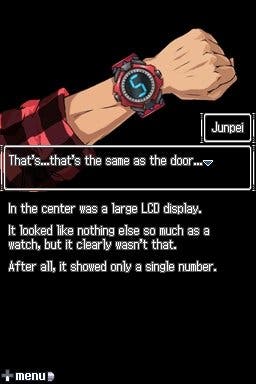999: Nine Hours, Nine Persons, Nine Doors
Emergency exits.
Characterisation is solid, reliant on only a few clichés whilst subverting others. There's an amnesiac hulk with a secret past (I guess memory loss had to come into it somewhere), a scantily-clad MILF dancer with a surprising ancillary skill, a guy that's so obviously the baddie it's clear he can't possibly be, and a vulnerable young girl concerned about her blind older brother who's more than capable of looking after himself. Some resonate more than others, but they all get their own revelations during the multiple play-throughs it takes to reach the proper ending.
The curious structure eventually makes sense within the context of the plot – with an explanation for the multiple endings that is at least consistent with the game's barmy internal logic – but it hampers the delivery. After reaching the first ending, which can take anywhere from six to 10 hours, you're encouraged to start again – this time with the ability to skip any repeat dialogue by holding right on the d-pad, a neat idea that doesn't quite go far enough. With some exchanges so lengthy you half expect Solid Snake to turn up, your thumb can be depressed for minutes at a time. A simple scene-skip would be more helpful.

You're also forced to complete puzzles you've already seen, which is hardly ideal, even if a few rooms yield additional dialogue should you choose different options. It's like being forced to watch a film several times over before you can view the ending, and while the ultimate climax is powerful enough to be worth the effort, the fact that completely arbitrary choices can affect the plot progression means you can easily find yourself at an ending you've already seen despite taking an entirely different path.
The translation is fairly polished but a few grammatical errors and dodgy lines slip through. "No doubt about it, they were numbered doors," says Junpei, upon discovering a series of doors with numbers on them. "He wiped a small trickle of blood from his nose with a raised eyebrow" suggests another line, a feat beyond even Carlo Ancelotti. There's also a curious tendency to use the phrase "metal on metal" whenever a door slams shut, which suggests a secret love of ageing rockers Anvil.
At its best, 999 is a gripping tale, studded with moments of brilliance. The first death is an early highlight: the visual representation shows subtle restraint while the description refuses to hold back, filling in the gory details with an almost unhealthy relish. Yet the second attempt over-elaborates, with talk of pizza dough and tomato sauce that will elicit guilty chuckles rather than revulsion. And while the puzzles are generally quite thoughtful, it's a real disappointment when you realise the finale hinges on a bloody Sudoku – and a pretty easy one at that.
The game 999 most reminded me of was the similarly dark – and bafflingly underrated – Lux-Pain, which was equally inconsistent and suffered from a significantly weaker translation, but arguably blended shocks and laughs a little more skilfully than this does. Expect the revolution in storytelling some have suggested and you'll be disappointed. But if you're in the mood for a faintly silly potboiler with a handful of cracking twists, you'll find this a thoroughly enjoyable read.
999: Nine Hours, Nine Persons, Nine Doors is out now for Nintendo DS in North America. There is no European release planned, but it's region-free and import-friendly.

